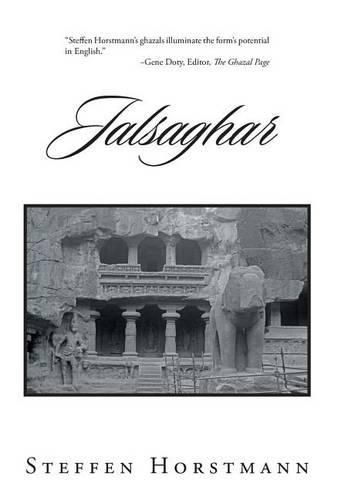Readings Newsletter
Become a Readings Member to make your shopping experience even easier.
Sign in or sign up for free!
You’re not far away from qualifying for FREE standard shipping within Australia
You’ve qualified for FREE standard shipping within Australia
The cart is loading…






This title is printed to order. This book may have been self-published. If so, we cannot guarantee the quality of the content. In the main most books will have gone through the editing process however some may not. We therefore suggest that you be aware of this before ordering this book. If in doubt check either the author or publisher’s details as we are unable to accept any returns unless they are faulty. Please contact us if you have any questions.
Praise for Jalsaghar
My hands memorize your hourglass waist. /Slow winds pass through distant sands, sifting grains. Imagine that beauty rethought in stanza after stanza. The ghazal is the Satie of poetry, sustained by the whirling dervish, its couplets braiding into the brain. Steffen Horstmann’s Jalsaghar is a stunning homage to the late Agha Shahid Ali.
-Terese Svoboda, author of Professor Harriman’s Steam Air-Ship
A rapproachment with a formal tradition demands incisive cultural evaluation; an assay of a formal tradition not one’s own demands that one become a naturalized citizen of a nation of poetry. The sure-footedness with which Steffen Horstmann navigates the ghazal form-a kind of poem often misunderstood in Anglophone practice-is a testimony to long and devoted study as well as to Horstmann’s skill as a practitioner, his keen ear, and his passion for the possibilities of the kind of detente poetry offers: a genuine cross-pollination of the music, the landscapes, the souls of distant and yet always kindred lives.
-T.R. Hummer, author of Skandalon
Steffen Horstmann’s book of contemporary ghazals shows us the ways in which form-in this case precise, musical, devotional in its origins-can act as a vehicle for meditation. The rhymes and repetitions of the ghazal are part prayer, part spell, and as such they bind together in language the world of material things and the world of spirit, which is also a world of longing. Agha Shahid Ali brought the tradition of the ghazal into the center of our contemporary and American poetic repertoire; Steffen Horstmann has carried it into our young century, made it new.
-Mark Wunderlich, author of The Earth Avails
$9.00 standard shipping within Australia
FREE standard shipping within Australia for orders over $100.00
Express & International shipping calculated at checkout
This title is printed to order. This book may have been self-published. If so, we cannot guarantee the quality of the content. In the main most books will have gone through the editing process however some may not. We therefore suggest that you be aware of this before ordering this book. If in doubt check either the author or publisher’s details as we are unable to accept any returns unless they are faulty. Please contact us if you have any questions.
Praise for Jalsaghar
My hands memorize your hourglass waist. /Slow winds pass through distant sands, sifting grains. Imagine that beauty rethought in stanza after stanza. The ghazal is the Satie of poetry, sustained by the whirling dervish, its couplets braiding into the brain. Steffen Horstmann’s Jalsaghar is a stunning homage to the late Agha Shahid Ali.
-Terese Svoboda, author of Professor Harriman’s Steam Air-Ship
A rapproachment with a formal tradition demands incisive cultural evaluation; an assay of a formal tradition not one’s own demands that one become a naturalized citizen of a nation of poetry. The sure-footedness with which Steffen Horstmann navigates the ghazal form-a kind of poem often misunderstood in Anglophone practice-is a testimony to long and devoted study as well as to Horstmann’s skill as a practitioner, his keen ear, and his passion for the possibilities of the kind of detente poetry offers: a genuine cross-pollination of the music, the landscapes, the souls of distant and yet always kindred lives.
-T.R. Hummer, author of Skandalon
Steffen Horstmann’s book of contemporary ghazals shows us the ways in which form-in this case precise, musical, devotional in its origins-can act as a vehicle for meditation. The rhymes and repetitions of the ghazal are part prayer, part spell, and as such they bind together in language the world of material things and the world of spirit, which is also a world of longing. Agha Shahid Ali brought the tradition of the ghazal into the center of our contemporary and American poetic repertoire; Steffen Horstmann has carried it into our young century, made it new.
-Mark Wunderlich, author of The Earth Avails